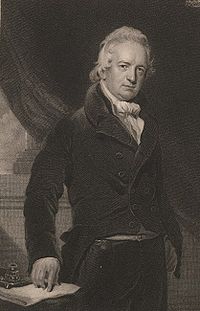- John Abernethy (surgeon)
-
John Abernethy FRS (3 April 1764 – 20 April 1831) was an English surgeon, grandson of the Reverend John Abernethy.[1]
He was born in Coleman Street in the City of London,[2] where his father was a merchant. Educated at Wolverhampton Grammar School, he was apprenticed in 1779 to Sir Charles Blicke (1745–1815), a surgeon at St Bartholomew's Hospital, London. He attended the anatomical lectures of Sir William Blizard (1743–1835) at the London Hospital, and was employed to assist as demonstrator; he also attended Percivall Pott's surgical lectures at St Bartholomew's Hospital, as well as the lectures of John Hunter. On Pott's resignation of the office of surgeon of St Bartholomew's, Sir Charles Blicke, who was assistant-surgeon, succeeded him, and Abernethy was elected assistant-surgeon in 1787.
In this capacity he began to give lectures at his house in Bartholomew Close, which were so well attended that the governors of the hospital built a theatre (1790–1791), and Abernethy thus became the founder of the medical school of St Bartholomew's. He held the office of assistant-surgeon for twenty-eight years, till, in 1815, he was elected principal surgeon. He had before that time been appointed lecturer in anatomy to the Royal College of Surgeons (1814). Abernethy was not a great operator, though his name is associated with the treatment of aneurysm by ligature of the external iliac artery.
His Surgical Observations on the Constitutional Origin and Treatment of Local Diseases (1809) — known as "My Book", from the great frequency with which he referred his patients to it, and to page 72 of it in particular, under that name — was one of the earliest popular works on medical science. So great was his zeal in encouraging patients to read the book that he earned the nickname "Doctor My-Book". He taught that local diseases were frequently the results of disordered states of the digestive organs, and were to be treated by purging and attention to diet. As a lecturer he was exceedingly attractive, and his success in teaching was largely attributable to the persuasiveness with which he enunciated his views. It has been said, however, that the influence he exerted on those who attended his lectures was not beneficial in this respect, that his opinions were delivered so dogmatically, and all who differed from him were disparaged and denounced so contemptuously, as to repress instead of stimulating inquiry. The celebrity he attained in his practice was due not only to his great professional skill, but also in part to his eccentricity. He was very blunt with his patients, treating them often brusquely and sometimes even rudely. He resigned his position at St Bartholomew's Hospital in 1827, and died at his residence at Enfield.
A collected edition of his works was published in 1830. A biography, Memoirs of John Abernethy, by George Macilwain (1797–1882), appeared in 1853.
John Abernathy is referenced in Edgar Allan Poe's, The Purloined letter, 1844.
References
- ^ Chambers Biographical Dictionary, ISBN 0-550-18022-2, page 5
- ^ Abernethy, John (1764-1831) (AIM25) accessed 3 February 2009
 This article incorporates text from a publication now in the public domain: Chisholm, Hugh, ed (1911). "Abernathy, John (surgeon)". Encyclopædia Britannica (11th ed.). Cambridge University Press.
This article incorporates text from a publication now in the public domain: Chisholm, Hugh, ed (1911). "Abernathy, John (surgeon)". Encyclopædia Britannica (11th ed.). Cambridge University Press.- This article incorporates text from the public domain 1907 edition of The Nuttall Encyclopædia.
External links
 Texts on Wikisource:
Texts on Wikisource:
- "Abernethy, John". Collier's New Encyclopedia. 1921.
- Chisholm, Hugh, ed (1911). "Abernethy, John (surgeon)". Encyclopædia Britannica (11th ed.). Cambridge University Press.
- "Abernethy, John (1764-1831)". Dictionary of National Biography. London: Smith, Elder & Co. 1885–1900.
- “John Abernethy” in Biographia Hibernica, 1822, by Richard Ryan
Categories:- 1764 births
- 1831 deaths
- English surgeons
- English anatomists
- Fellows of the Royal Society
- Old Wulfrunians
- People from the City of London
- People from Wolverhampton
- Alumni of the Medical College of St Bartholomew's Hospital
- Fellows of the Royal College of Surgeons
Wikimedia Foundation. 2010.

